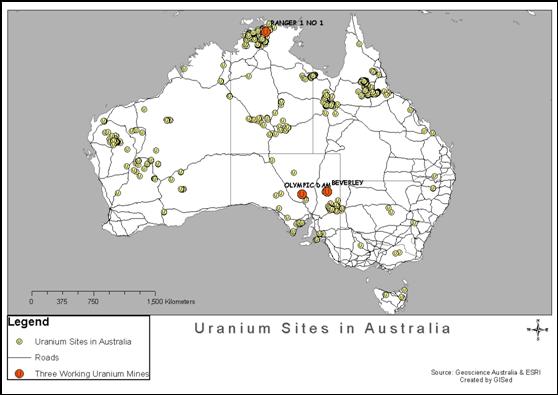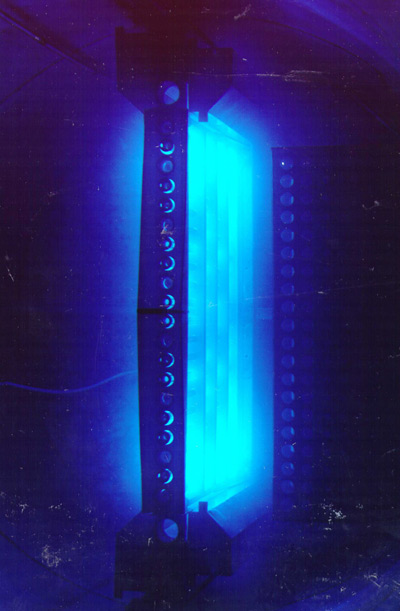
| THE HANDSTAND | AUGUST-OCTOBER2009 |

australia nuclear
Garrett’s back flip on uranium mining is not
his first sellout; here is a small number of other
turnarounds:
- At the end of January 2009, Garrett announced he will give the go ahead to the $110 million expansion expansion of an open cut mine that will divert the McArthur River in the Northern Territory six kilometres off course. His ministerial decision overruled the Federal Court that said that the original approval was granted inappropriately. The survival of migrant birds and fish that depend on the McArthur are threatened through Garrett’s decision; Aboriginal groups who have fought hard to cease the expansion said they were ignored. Xstrata, the company in control of the mine, has refused since 1993 to pay compensation to Aboriginal people and has been accused of denying traditional owners access to sacred sites. It should be remembered, that Garrett as the former lead singer of Midnight Oil was famous for his protest songs in support of indigenous land rights and self-determination.
- Gunns’ Limited, while battling significant public pressure and repeated setbacks trying to build a pulp mill in Tasmania’s Tamar Valley, has enjoyed numerous concessions from both the previous Coalition government and now Garrett. While trying to appear tough on the controversial pulp mill plans, Garrett has followed the same environmental approval procedure that was arranged by Malcolm Turnbull when he was environment minister in 2007. Turnbull, for his part, was accused of “doing deals” and accepting donations on behalf on the Liberal party from Gunns throughout his term, the October 2, 2007 Australian reported. Choosing to ignore massive public disapproval and outrage — an internet poll on January 15 found that 47% of Tasmanians strongly disagree with approving the pulp mill — Garrett has indicated initial construction can start if the company chooses to doso. He indicated he will give full approval once his “tough conditions” are met. The “tough conditions”, however, are exactly what Gunns offered to abide by in the first place.
- On August 28, 2008 Garrett approved expanding the Beverley uranium mine in South Australia’s far north-east. The Beverley mine is known for a burst pipe that leaked 62,000 litres of radioactive material in 2002. The mine also is owned by an affiliate to one of the largest arms dealers in the world, General Atomics, which will own the just approved Four Mile mine.
- Soon after, when the WA Liberal government announced lifting the ban on uranium mining on November 18, 2008 Garrett offered no challenge. “We knew that Western Australia had a policy for opening up its uranium mining — that’s a decision that the West Australian government has taken”, he told the Australian on November 18, 2008.
- Instead of demanding “let’s pay the rent, let’s give it back”, as he sung in “Beds are Burning” and call for an end to the racist Northern Territory intervention, Garrett offered this for Aboriginal people on May 26, 2008: “We should be introducing it [income management] here, in my electorate, in [the Sydney suburb of] La Perouse”.
- Rather than continuing to oppose the US/Australia military alliance — as Garrett urged in the classic protest song “US Forces” — Garrett backtracked in 2004 saying “I don’t believe [US military facility] Pine Gap should be closed.” He also “unreservedly” supported the establishment of a US military spy facility near Geraldton, telling journalists on February 17, 2007: “Of course you change your mind about some things over time.”
Garrett’s conversion from activist to conservative politician and the accompanying values sellout isn’t a new phenomena; he telegraphed his political backsliding before he took office. He confirmed suspicions of many by telling the 7.30 Report on June 10, 2004, he was “ready to come mainstream”. “I’ve matured my views”, he said. And he has justified his conservative politics as “a part of growing up”, according to the Herald Sun in 2004. Garrett also was present when the ALP voted to drop its “no new uranium mines” policy at the national conference in 2007. Then shadow environment minister, Garrett did not fight the decision and instead pledged to accept and promote it, wanting to be a “team player”, said The Age on April 29, 2007.
The Four Mile Uranium Project is located 550km north of Adelaide in South Australia
Revealed: secretive arms tycoon behind new uranium mine

Ben Cubby Environment Reporter
July 16, 2009
THE new uranium mine approved by the Environment Minister, Peter Garrett, will be owned by a subsidiary of one of the world’s biggest arms dealers.
A colourful but reclusive billionaire named James Neal Blue, who helped devise the Predator unmanned aircraft being used in the wars in Afghanistan and Iraq, is a director of Quasar Resources – the company that will control the Four Mile mine.
Quasar Resources is an affiliate of General Atomics, a US weapons and nuclear energy corporation which is chaired by Mr Blue, and reportedly holds $US700 million ($877 million) in Pentagon contracts. Mr Blue, 74, first came to prominence during the 1980s as a self-described “enthusiastic supporter” of US involvement in a covert war against the left-wing government in Nicaragua.
Next to the new Four Mile mine is the Beverley uranium mine, which is owned by Heathgate Resources, also affiliated to Mr Blue’s General Atomics, meaning that almost 200 square kilometres is now dedicated to the two related mines.
Mr Garrett yesterday defended the decision to grant environmental approval for the Four Mile mine, saying there would be strict monitoring of radioactive waste.
The decision was endorsed by the Opposition Leader, Malcolm Turnbull, and by the Minerals Council of Australia.
Mr Garrett, a former environmental campaigner who protested against both uranium mining and the US military presence in Australia, denied yesterday that he had compromised his principles.
“Look that is an old song, it’s an old cycle that we hear from political opponents who seem to forget that I joined the Labor Party, I became a member of the Government and I said at the time that I would accept, as a team player, the decisions that the Government took,” he said.
“And my job, as a consequence of that, is to support the Government’s decision clearly and make sure as Environment Minister that I set the bar on environmental protection as high as it needs to go and that is world’s best practice and that is what we have done with this decision.”
However environmental groups have serious concerns about the height of that bar, pointing out that there is no requirement for the company to ever clean up the radioactive plumes which can be expected to drift slowly around in the water table.
The Beverley mine, which uses the same acid corrosion technique to extract uranium from aquifers as will be used at Four Mile, has recorded 59 spills of radioactive material in the past decade, according to the South Australian Department of Primary Industries and Resources.
Mr Blue’s Quasar Resources has joined the Australian mineral exploration company Alliance Resources to set up the mine.
According to The New York Times, Mr Blue once part-owned a cocoa and banana plantation in Nicaragua with the family of former president Anastasio Somoza.
He told the paper he was supportive of the Contra guerillas that fought Nicaragua’s Sandinista government but refused to discuss any link to CIA operations in that country.
Mr Blue’s brother, Linden, was briefly imprisoned by the Cuban dictator Fidel Castro after apparently violating Cuban air space in a private aircraft.
Mr Blue established a business empire based on oil and real estate, before moving into weapons and nuclear power.
He is regarded as a pioneer of the unmanned aircraft that the US military uses to spy on and bomb its enemies.
General Atomics has also prospered, and between 2000 and 2005 it was the biggest corporate sponsor of travel for members of the US Congress and their families and aides.
Mr Blue bought tracts of uranium-rich land in Australia decades ago, before the Federal Government had approved uranium mining, according to a profile in Fortune magazine.
Uranium from the Four Mile mine will gradually replace ore from the decade-old Beverley mine, with most of the exported uranium expected to be sent to reactors in the US.